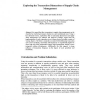Free Online Productivity Tools
i2Speak
i2Symbol
i2OCR
iTex2Img
iWeb2Print
iWeb2Shot
i2Type
iPdf2Split
iPdf2Merge
i2Bopomofo
i2Arabic
i2Style
i2Image
i2PDF
iLatex2Rtf
Sci2ools
107
click to vote
IJNVO
2007
2007
Exploring the transaction dimensions of supply chain management
It is argued that firm cooperation in supply chain management can be classified as a hybrid governance structure in a new institutional sense. Using a key informant survey, exploratory data on transaction dimensions and supply chain management was gathered and analyzed. Findings suggest that the implementation of such cooperation is not a binary choice but rather a matter of varying degrees. All factors commonly associated with influencing transaction costs (asset specificity, uncertainty and frequency) are significantly higher for firms with more fully implemented supply chain management, making a more integrated solution advantageous. Additionally, the data suggests a strong influence of transaction frequency on the degree of asset specificity and uncertainty.
Related Content
| Added | 15 Dec 2010 |
| Updated | 15 Dec 2010 |
| Type | Journal |
| Year | 2007 |
| Where | IJNVO |
| Authors | Britta Lietke, Madlen Boslau |
Comments (0)

